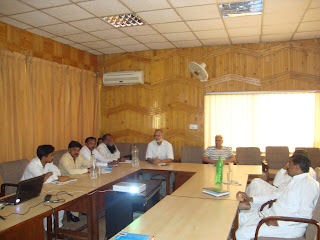A TWG meeting was held at Faisalabad, Pakistan on 16th May, 2012. Representatives of
research, extension, UAF, Pvt industry and farmers participated the meeting
(list attached). The agenda of meeting was upcoming DSR technology. Burning of
wheat residues, seed rate, method of planting, irrigation and weed control came
under intense discussion. Dr. M. Aqil Khan, Country Coordinator, CSISA, Pakistan welcomed the participants and gave a power point presentation to the
participants on the subject. An open discussion took place and every body
shared their experience. Burning of wheat straw is widespread especially after
combine harvesting which causes loss of valuable organic matter and obnoxious
source of air pollution leading to respiratory diseases and tragic traffic
accidents. A farmer added that burning is practiced due to lack of proper
machinery for ploughing in heavily strawed fields and the farmers’ impression
that the following rice crop wears yellow and sickly look and, therefore, low
yield. However, other farmers disagreed and talked of the positive effect of
residue incorporation. Residue decomposition, however, needs extra nitrogen application
to speed up digestion. Farmers were suggested by CSISA management to undertake
observation plantings of straw burial and its effects on rice crop. Director
Agronomy, AARI observed that it is a researchable issue and should be
investigated. Participants agreed that
disking is the best available means to plow in wheat straw but it disturbs the
field level and LL is necessary there after. Other aspects of DSR were also
discussed. Farmers were generally satisfied with various planting techniques to
establish the crop. Every method tried – dry sowing versus stale planting or
drill versus broadcast all proved good as crop establishment means. A major
emphasis was placed on weed control. All agreed that the success of DSR hinges
on successful weed control. CSISA management related its experience about the
subject and gave a graphic presentation on various weeds and their control.
Farmers were apprised of weed threat and how to combat it. Irrigation practices
related to DSR were also discussed and means to save water were elaborated/ discussed
and a recommendation was developed on the subject.
Dr. Khan, further briefed the participants about CSISA
project and the various successes/failures in DSR. A pamphlet regarding
production technology of DSR was distributed amongst all at the outset for
comments, suggestions and further improvement. Widespread use of rotavator came
under discussion. CSSISA highlighted various negative effects of the rotavator
use.
The farmers were invited to explain their previous DSR experience.
Muhammad Shah, a progressive farmer of district Okara who has already sown 4 acres
DSR explained his techniques. He has successfully used broadcast sowing in
standing water. Mr. Ahsan, a farmer from district Hafizabad, however, was in
favor of preplanting irrigation for planting. Participants were told that
traditional wheat drill and CSISA planter has also been used successfully to
sow the crop.
The farmers as well as CSISA team had a bitter experience of
madhana grass especially in non-core areas. The
participants were told that the use of 250 ml Puma super alongwith recommended
dose of clover 12-15 days after sowing has successfully controlled madhana
grass as well.
The participants were apprised that CSISA team has held training
programs of farmers for laying out supervised demonstrations/ trials on DSR as
well as its widespread adoption trials amongst the farmers. Director PPRI
expressed his views regarding disease incidence on DSR and transplanted rice.
It was decided that CSISA team will provide him the list of supervised
demos/trials for conducting field trails on disease happening.
At the end Country Coordinator thanked the participants for their
valuable suggestions and joining the meeting to review the production package.
 |
Dr. Khan explaining DSR
|
 |
Participants
|



























